A Comparative Analysis of Financial and Management Accounting Methods
VerifiedAdded on 2023/01/11
|8
|1617
|90
Report
AI Summary
This report provides a comprehensive comparison between financial accounting and management accounting. It begins by defining both concepts and highlighting their fundamental differences, including their purposes, target audiences, and the types of information they provide. Financial accounting focuses on preparing financial statements for external stakeholders such as investors and creditors, adhering to specific accounting standards and regulations. Management accounting, on the other hand, is tailored for internal use, assisting managers in decision-making, planning, and controlling business operations. The report details the usefulness of each accounting type to both internal and external users, emphasizing how financial accounting aids in assessing overall financial performance, while management accounting supports strategic choices and operational efficiency. The conclusion underscores the importance of both accounting methods for sound financial management and organizational success, referencing various scholarly sources to support its analysis.

Business
Finance
Finance
Paraphrase This Document
Need a fresh take? Get an instant paraphrase of this document with our AI Paraphraser
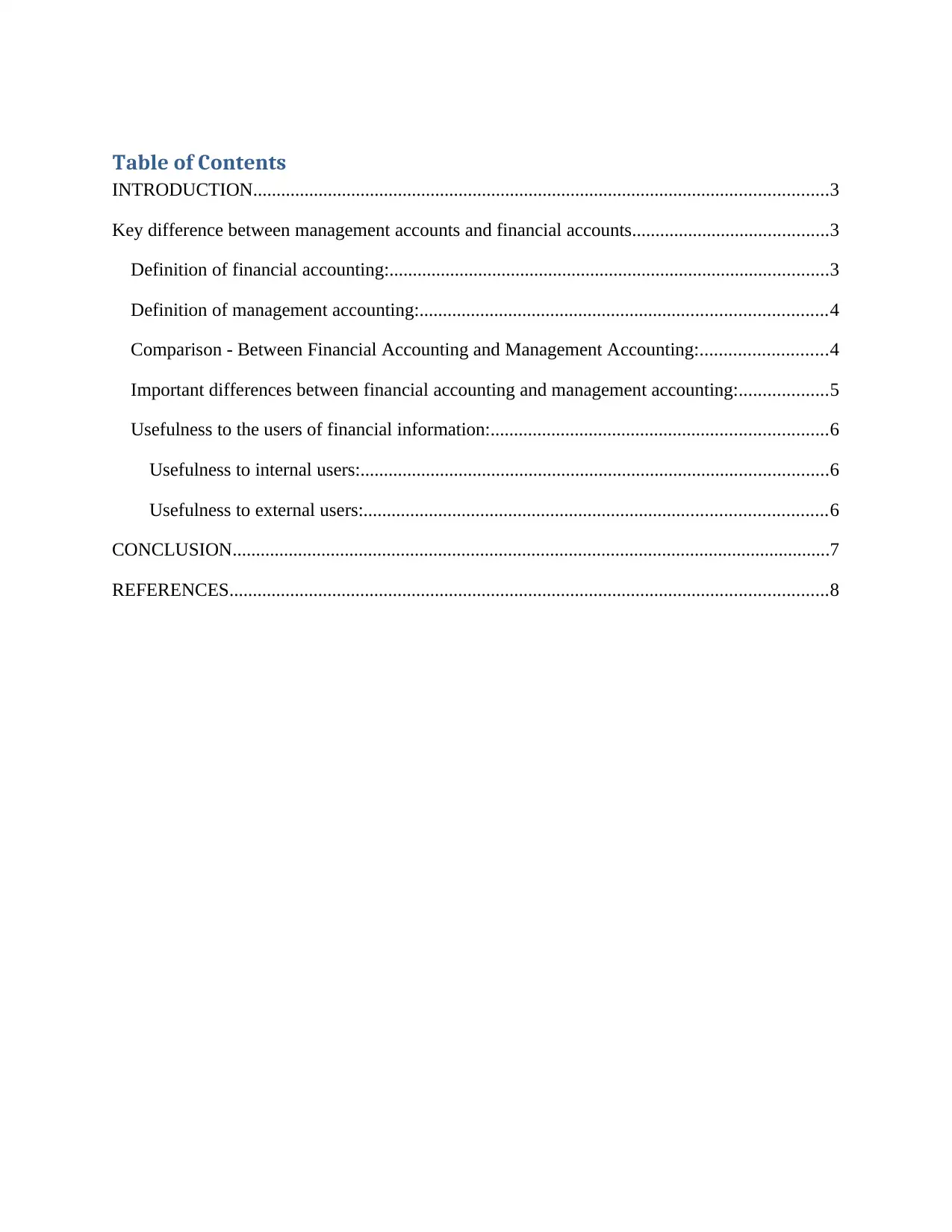
Table of Contents
INTRODUCTION...........................................................................................................................3
Key difference between management accounts and financial accounts..........................................3
Definition of financial accounting:..............................................................................................3
Definition of management accounting:.......................................................................................4
Comparison - Between Financial Accounting and Management Accounting:...........................4
Important differences between financial accounting and management accounting:...................5
Usefulness to the users of financial information:........................................................................6
Usefulness to internal users:....................................................................................................6
Usefulness to external users:...................................................................................................6
CONCLUSION................................................................................................................................7
REFERENCES................................................................................................................................8
INTRODUCTION...........................................................................................................................3
Key difference between management accounts and financial accounts..........................................3
Definition of financial accounting:..............................................................................................3
Definition of management accounting:.......................................................................................4
Comparison - Between Financial Accounting and Management Accounting:...........................4
Important differences between financial accounting and management accounting:...................5
Usefulness to the users of financial information:........................................................................6
Usefulness to internal users:....................................................................................................6
Usefulness to external users:...................................................................................................6
CONCLUSION................................................................................................................................7
REFERENCES................................................................................................................................8
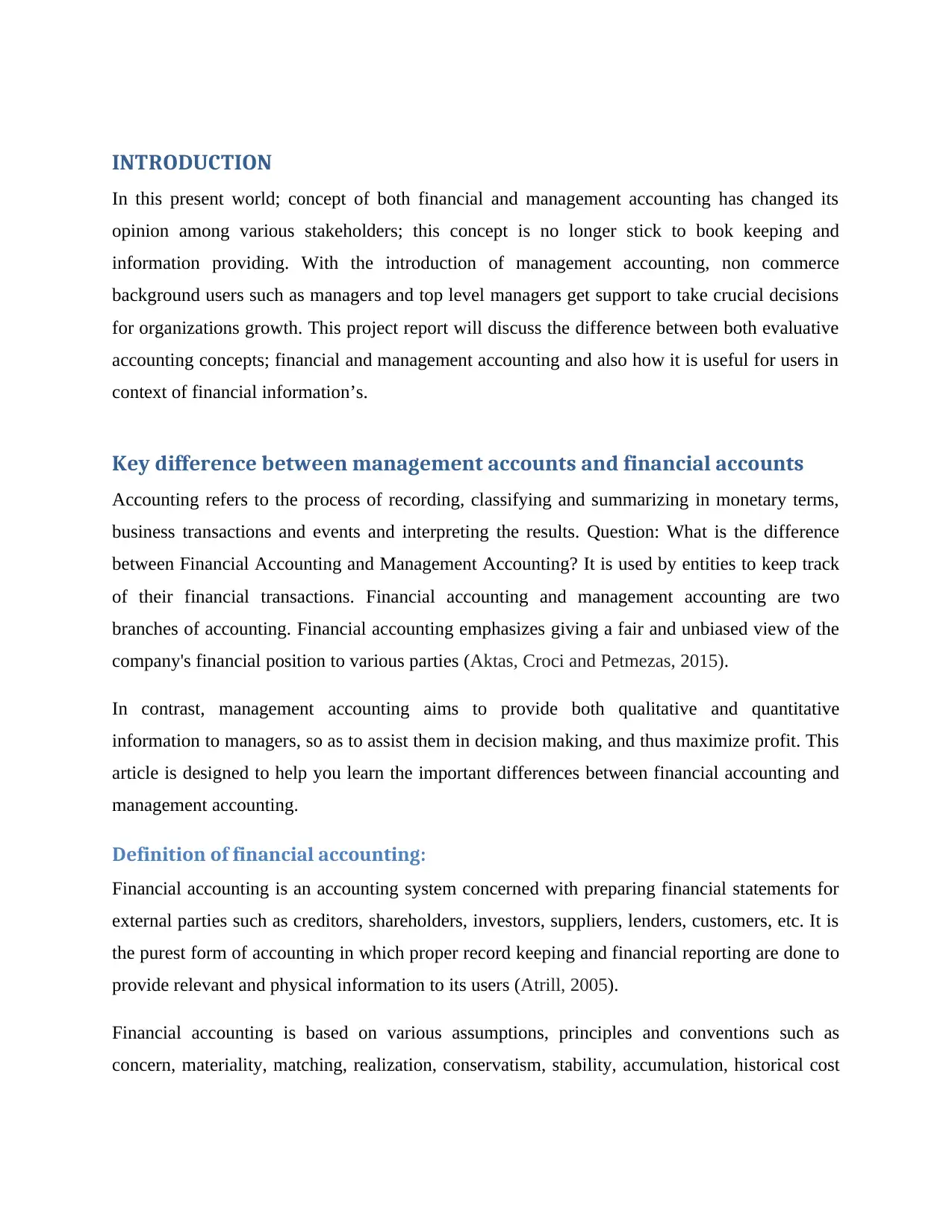
INTRODUCTION
In this present world; concept of both financial and management accounting has changed its
opinion among various stakeholders; this concept is no longer stick to book keeping and
information providing. With the introduction of management accounting, non commerce
background users such as managers and top level managers get support to take crucial decisions
for organizations growth. This project report will discuss the difference between both evaluative
accounting concepts; financial and management accounting and also how it is useful for users in
context of financial information’s.
Key difference between management accounts and financial accounts
Accounting refers to the process of recording, classifying and summarizing in monetary terms,
business transactions and events and interpreting the results. Question: What is the difference
between Financial Accounting and Management Accounting? It is used by entities to keep track
of their financial transactions. Financial accounting and management accounting are two
branches of accounting. Financial accounting emphasizes giving a fair and unbiased view of the
company's financial position to various parties (Aktas, Croci and Petmezas, 2015).
In contrast, management accounting aims to provide both qualitative and quantitative
information to managers, so as to assist them in decision making, and thus maximize profit. This
article is designed to help you learn the important differences between financial accounting and
management accounting.
Definition of financial accounting:
Financial accounting is an accounting system concerned with preparing financial statements for
external parties such as creditors, shareholders, investors, suppliers, lenders, customers, etc. It is
the purest form of accounting in which proper record keeping and financial reporting are done to
provide relevant and physical information to its users (Atrill, 2005).
Financial accounting is based on various assumptions, principles and conventions such as
concern, materiality, matching, realization, conservatism, stability, accumulation, historical cost
In this present world; concept of both financial and management accounting has changed its
opinion among various stakeholders; this concept is no longer stick to book keeping and
information providing. With the introduction of management accounting, non commerce
background users such as managers and top level managers get support to take crucial decisions
for organizations growth. This project report will discuss the difference between both evaluative
accounting concepts; financial and management accounting and also how it is useful for users in
context of financial information’s.
Key difference between management accounts and financial accounts
Accounting refers to the process of recording, classifying and summarizing in monetary terms,
business transactions and events and interpreting the results. Question: What is the difference
between Financial Accounting and Management Accounting? It is used by entities to keep track
of their financial transactions. Financial accounting and management accounting are two
branches of accounting. Financial accounting emphasizes giving a fair and unbiased view of the
company's financial position to various parties (Aktas, Croci and Petmezas, 2015).
In contrast, management accounting aims to provide both qualitative and quantitative
information to managers, so as to assist them in decision making, and thus maximize profit. This
article is designed to help you learn the important differences between financial accounting and
management accounting.
Definition of financial accounting:
Financial accounting is an accounting system concerned with preparing financial statements for
external parties such as creditors, shareholders, investors, suppliers, lenders, customers, etc. It is
the purest form of accounting in which proper record keeping and financial reporting are done to
provide relevant and physical information to its users (Atrill, 2005).
Financial accounting is based on various assumptions, principles and conventions such as
concern, materiality, matching, realization, conservatism, stability, accumulation, historical cost
⊘ This is a preview!⊘
Do you want full access?
Subscribe today to unlock all pages.

Trusted by 1+ million students worldwide
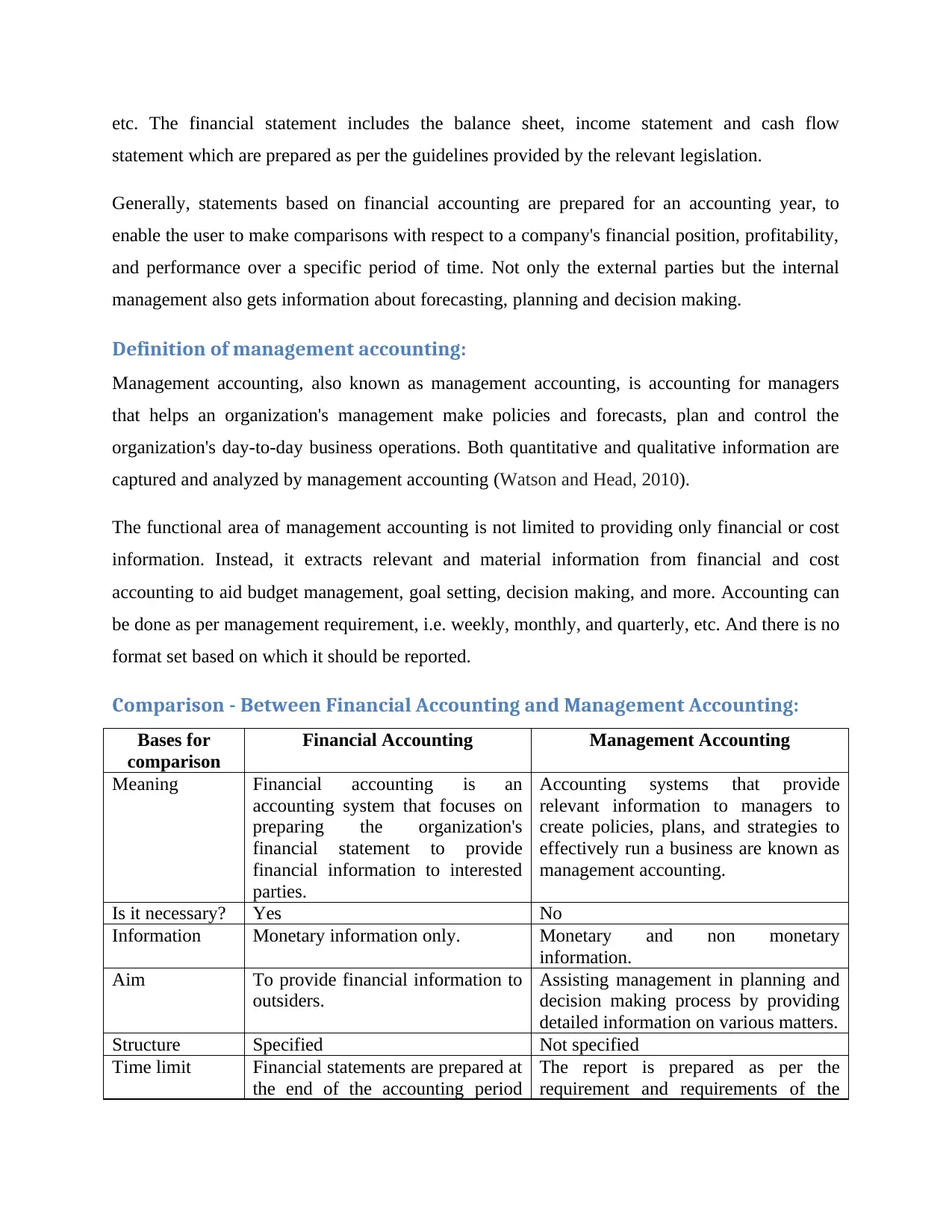
etc. The financial statement includes the balance sheet, income statement and cash flow
statement which are prepared as per the guidelines provided by the relevant legislation.
Generally, statements based on financial accounting are prepared for an accounting year, to
enable the user to make comparisons with respect to a company's financial position, profitability,
and performance over a specific period of time. Not only the external parties but the internal
management also gets information about forecasting, planning and decision making.
Definition of management accounting:
Management accounting, also known as management accounting, is accounting for managers
that helps an organization's management make policies and forecasts, plan and control the
organization's day-to-day business operations. Both quantitative and qualitative information are
captured and analyzed by management accounting (Watson and Head, 2010).
The functional area of management accounting is not limited to providing only financial or cost
information. Instead, it extracts relevant and material information from financial and cost
accounting to aid budget management, goal setting, decision making, and more. Accounting can
be done as per management requirement, i.e. weekly, monthly, and quarterly, etc. And there is no
format set based on which it should be reported.
Comparison - Between Financial Accounting and Management Accounting:
Bases for
comparison
Financial Accounting Management Accounting
Meaning Financial accounting is an
accounting system that focuses on
preparing the organization's
financial statement to provide
financial information to interested
parties.
Accounting systems that provide
relevant information to managers to
create policies, plans, and strategies to
effectively run a business are known as
management accounting.
Is it necessary? Yes No
Information Monetary information only. Monetary and non monetary
information.
Aim To provide financial information to
outsiders.
Assisting management in planning and
decision making process by providing
detailed information on various matters.
Structure Specified Not specified
Time limit Financial statements are prepared at
the end of the accounting period
The report is prepared as per the
requirement and requirements of the
statement which are prepared as per the guidelines provided by the relevant legislation.
Generally, statements based on financial accounting are prepared for an accounting year, to
enable the user to make comparisons with respect to a company's financial position, profitability,
and performance over a specific period of time. Not only the external parties but the internal
management also gets information about forecasting, planning and decision making.
Definition of management accounting:
Management accounting, also known as management accounting, is accounting for managers
that helps an organization's management make policies and forecasts, plan and control the
organization's day-to-day business operations. Both quantitative and qualitative information are
captured and analyzed by management accounting (Watson and Head, 2010).
The functional area of management accounting is not limited to providing only financial or cost
information. Instead, it extracts relevant and material information from financial and cost
accounting to aid budget management, goal setting, decision making, and more. Accounting can
be done as per management requirement, i.e. weekly, monthly, and quarterly, etc. And there is no
format set based on which it should be reported.
Comparison - Between Financial Accounting and Management Accounting:
Bases for
comparison
Financial Accounting Management Accounting
Meaning Financial accounting is an
accounting system that focuses on
preparing the organization's
financial statement to provide
financial information to interested
parties.
Accounting systems that provide
relevant information to managers to
create policies, plans, and strategies to
effectively run a business are known as
management accounting.
Is it necessary? Yes No
Information Monetary information only. Monetary and non monetary
information.
Aim To provide financial information to
outsiders.
Assisting management in planning and
decision making process by providing
detailed information on various matters.
Structure Specified Not specified
Time limit Financial statements are prepared at
the end of the accounting period
The report is prepared as per the
requirement and requirements of the
Paraphrase This Document
Need a fresh take? Get an instant paraphrase of this document with our AI Paraphraser
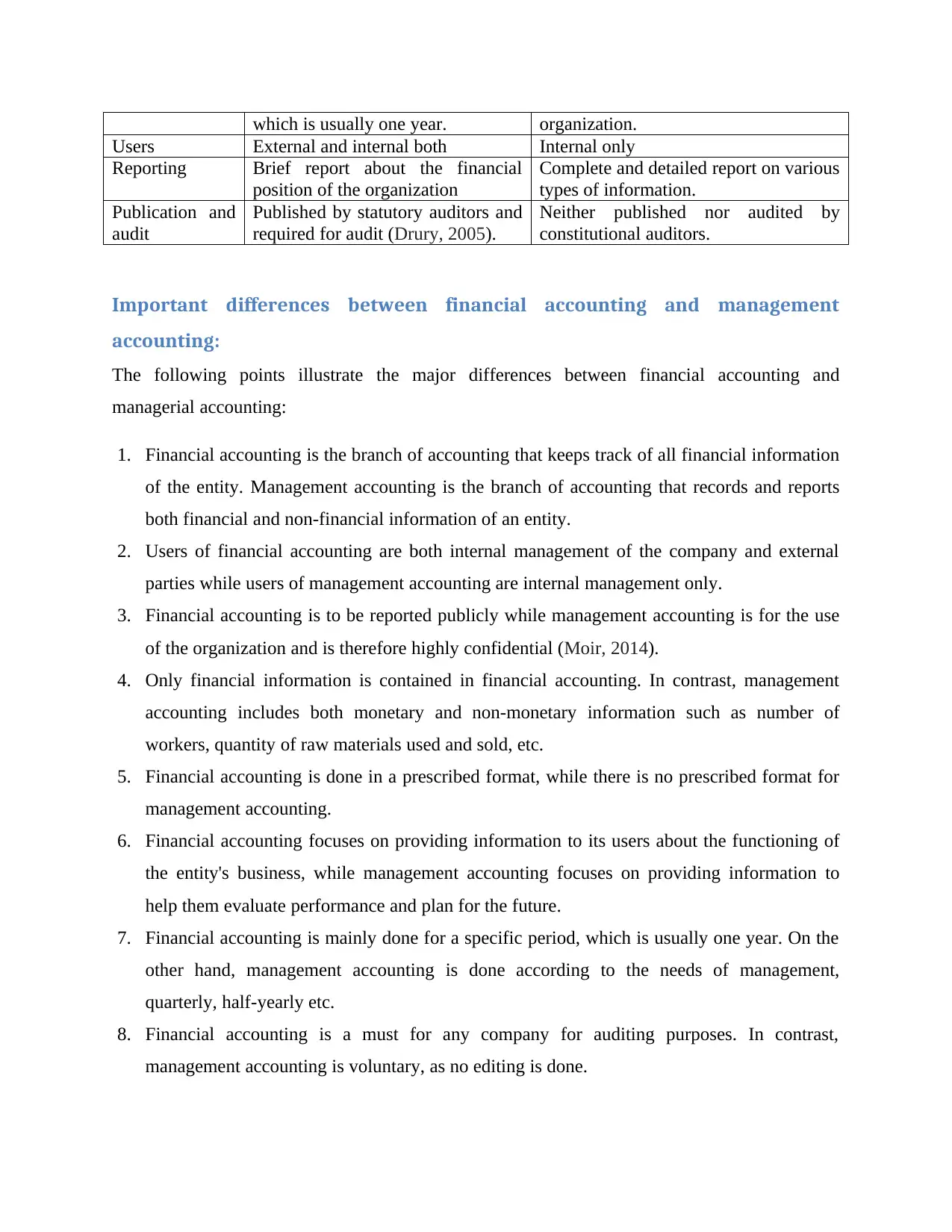
which is usually one year. organization.
Users External and internal both Internal only
Reporting Brief report about the financial
position of the organization
Complete and detailed report on various
types of information.
Publication and
audit
Published by statutory auditors and
required for audit (Drury, 2005).
Neither published nor audited by
constitutional auditors.
Important differences between financial accounting and management
accounting:
The following points illustrate the major differences between financial accounting and
managerial accounting:
1. Financial accounting is the branch of accounting that keeps track of all financial information
of the entity. Management accounting is the branch of accounting that records and reports
both financial and non-financial information of an entity.
2. Users of financial accounting are both internal management of the company and external
parties while users of management accounting are internal management only.
3. Financial accounting is to be reported publicly while management accounting is for the use
of the organization and is therefore highly confidential (Moir, 2014).
4. Only financial information is contained in financial accounting. In contrast, management
accounting includes both monetary and non-monetary information such as number of
workers, quantity of raw materials used and sold, etc.
5. Financial accounting is done in a prescribed format, while there is no prescribed format for
management accounting.
6. Financial accounting focuses on providing information to its users about the functioning of
the entity's business, while management accounting focuses on providing information to
help them evaluate performance and plan for the future.
7. Financial accounting is mainly done for a specific period, which is usually one year. On the
other hand, management accounting is done according to the needs of management,
quarterly, half-yearly etc.
8. Financial accounting is a must for any company for auditing purposes. In contrast,
management accounting is voluntary, as no editing is done.
Users External and internal both Internal only
Reporting Brief report about the financial
position of the organization
Complete and detailed report on various
types of information.
Publication and
audit
Published by statutory auditors and
required for audit (Drury, 2005).
Neither published nor audited by
constitutional auditors.
Important differences between financial accounting and management
accounting:
The following points illustrate the major differences between financial accounting and
managerial accounting:
1. Financial accounting is the branch of accounting that keeps track of all financial information
of the entity. Management accounting is the branch of accounting that records and reports
both financial and non-financial information of an entity.
2. Users of financial accounting are both internal management of the company and external
parties while users of management accounting are internal management only.
3. Financial accounting is to be reported publicly while management accounting is for the use
of the organization and is therefore highly confidential (Moir, 2014).
4. Only financial information is contained in financial accounting. In contrast, management
accounting includes both monetary and non-monetary information such as number of
workers, quantity of raw materials used and sold, etc.
5. Financial accounting is done in a prescribed format, while there is no prescribed format for
management accounting.
6. Financial accounting focuses on providing information to its users about the functioning of
the entity's business, while management accounting focuses on providing information to
help them evaluate performance and plan for the future.
7. Financial accounting is mainly done for a specific period, which is usually one year. On the
other hand, management accounting is done according to the needs of management,
quarterly, half-yearly etc.
8. Financial accounting is a must for any company for auditing purposes. In contrast,
management accounting is voluntary, as no editing is done.
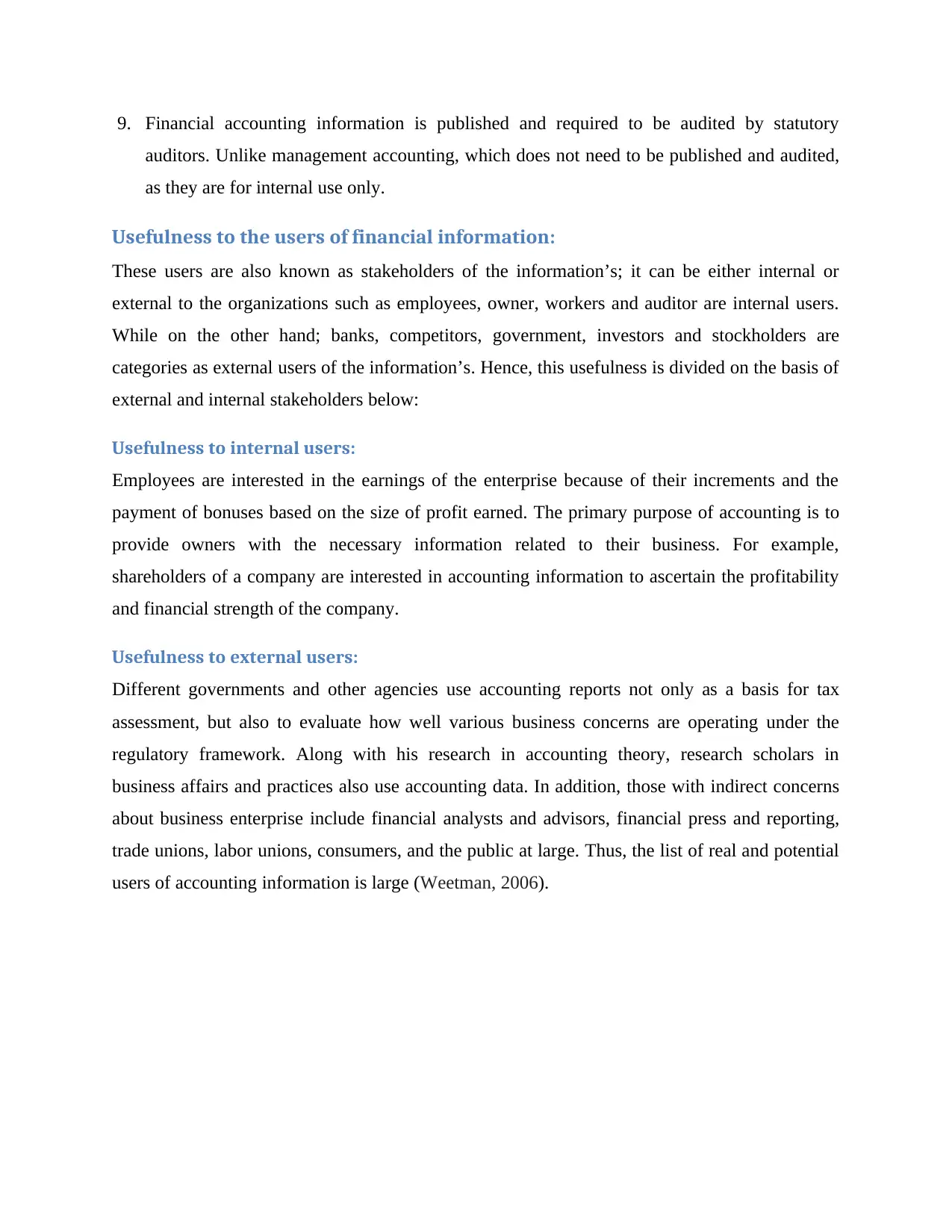
9. Financial accounting information is published and required to be audited by statutory
auditors. Unlike management accounting, which does not need to be published and audited,
as they are for internal use only.
Usefulness to the users of financial information:
These users are also known as stakeholders of the information’s; it can be either internal or
external to the organizations such as employees, owner, workers and auditor are internal users.
While on the other hand; banks, competitors, government, investors and stockholders are
categories as external users of the information’s. Hence, this usefulness is divided on the basis of
external and internal stakeholders below:
Usefulness to internal users:
Employees are interested in the earnings of the enterprise because of their increments and the
payment of bonuses based on the size of profit earned. The primary purpose of accounting is to
provide owners with the necessary information related to their business. For example,
shareholders of a company are interested in accounting information to ascertain the profitability
and financial strength of the company.
Usefulness to external users:
Different governments and other agencies use accounting reports not only as a basis for tax
assessment, but also to evaluate how well various business concerns are operating under the
regulatory framework. Along with his research in accounting theory, research scholars in
business affairs and practices also use accounting data. In addition, those with indirect concerns
about business enterprise include financial analysts and advisors, financial press and reporting,
trade unions, labor unions, consumers, and the public at large. Thus, the list of real and potential
users of accounting information is large (Weetman, 2006).
auditors. Unlike management accounting, which does not need to be published and audited,
as they are for internal use only.
Usefulness to the users of financial information:
These users are also known as stakeholders of the information’s; it can be either internal or
external to the organizations such as employees, owner, workers and auditor are internal users.
While on the other hand; banks, competitors, government, investors and stockholders are
categories as external users of the information’s. Hence, this usefulness is divided on the basis of
external and internal stakeholders below:
Usefulness to internal users:
Employees are interested in the earnings of the enterprise because of their increments and the
payment of bonuses based on the size of profit earned. The primary purpose of accounting is to
provide owners with the necessary information related to their business. For example,
shareholders of a company are interested in accounting information to ascertain the profitability
and financial strength of the company.
Usefulness to external users:
Different governments and other agencies use accounting reports not only as a basis for tax
assessment, but also to evaluate how well various business concerns are operating under the
regulatory framework. Along with his research in accounting theory, research scholars in
business affairs and practices also use accounting data. In addition, those with indirect concerns
about business enterprise include financial analysts and advisors, financial press and reporting,
trade unions, labor unions, consumers, and the public at large. Thus, the list of real and potential
users of accounting information is large (Weetman, 2006).
⊘ This is a preview!⊘
Do you want full access?
Subscribe today to unlock all pages.

Trusted by 1+ million students worldwide

CONCLUSION
Hence, on the basis of above analysis, it can be concluded that; both management and financial
accounting are important on the basis of their uses. To make decisions, strategies and changes,
management accounting plays a major role. On the other hand; financial accounting is useful in
controlling costs and generating report for investors and money lenders.
Hence, on the basis of above analysis, it can be concluded that; both management and financial
accounting are important on the basis of their uses. To make decisions, strategies and changes,
management accounting plays a major role. On the other hand; financial accounting is useful in
controlling costs and generating report for investors and money lenders.
Paraphrase This Document
Need a fresh take? Get an instant paraphrase of this document with our AI Paraphraser
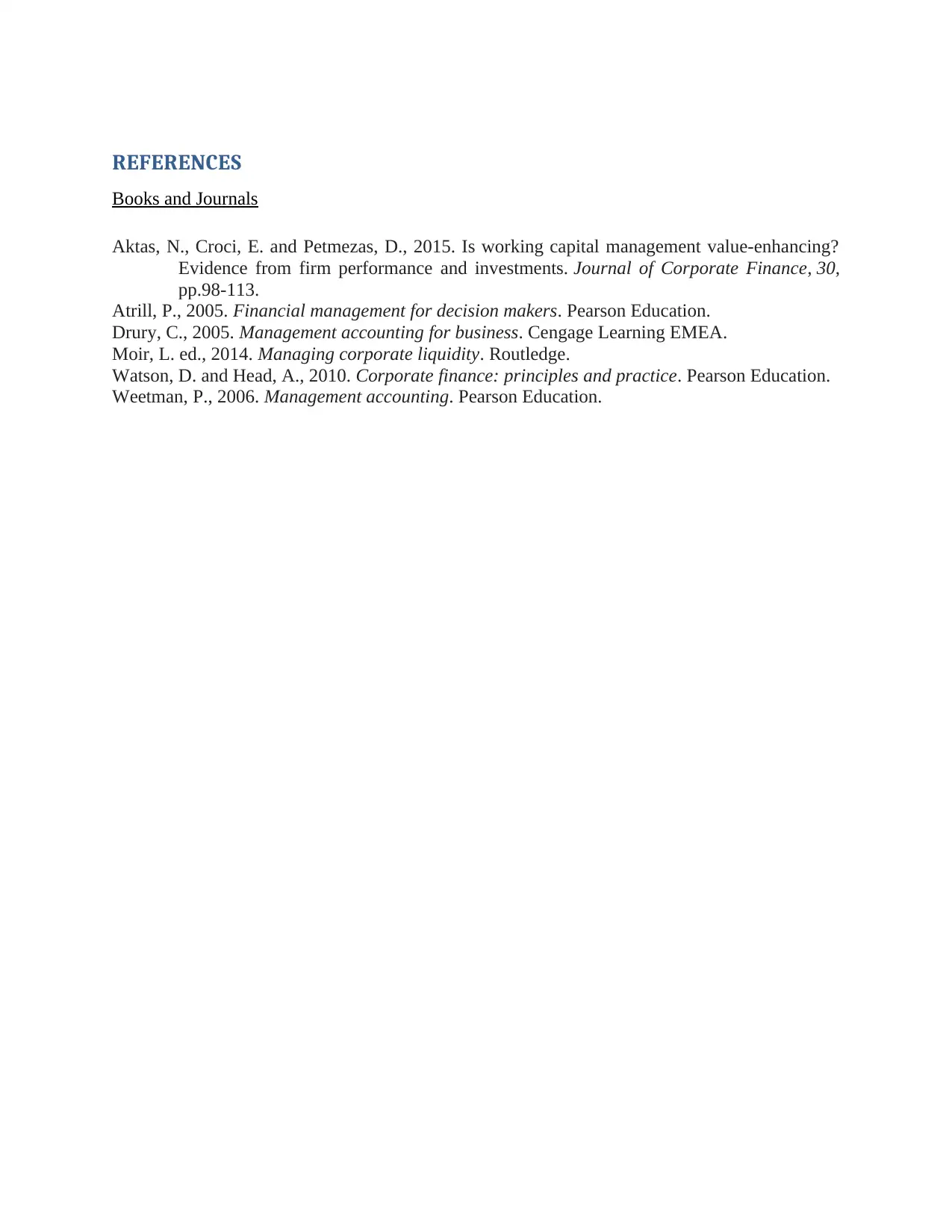
REFERENCES
Books and Journals
Aktas, N., Croci, E. and Petmezas, D., 2015. Is working capital management value-enhancing?
Evidence from firm performance and investments. Journal of Corporate Finance, 30,
pp.98-113.
Atrill, P., 2005. Financial management for decision makers. Pearson Education.
Drury, C., 2005. Management accounting for business. Cengage Learning EMEA.
Moir, L. ed., 2014. Managing corporate liquidity. Routledge.
Watson, D. and Head, A., 2010. Corporate finance: principles and practice. Pearson Education.
Weetman, P., 2006. Management accounting. Pearson Education.
Books and Journals
Aktas, N., Croci, E. and Petmezas, D., 2015. Is working capital management value-enhancing?
Evidence from firm performance and investments. Journal of Corporate Finance, 30,
pp.98-113.
Atrill, P., 2005. Financial management for decision makers. Pearson Education.
Drury, C., 2005. Management accounting for business. Cengage Learning EMEA.
Moir, L. ed., 2014. Managing corporate liquidity. Routledge.
Watson, D. and Head, A., 2010. Corporate finance: principles and practice. Pearson Education.
Weetman, P., 2006. Management accounting. Pearson Education.
1 out of 8
Related Documents
Your All-in-One AI-Powered Toolkit for Academic Success.
+13062052269
info@desklib.com
Available 24*7 on WhatsApp / Email
![[object Object]](/_next/static/media/star-bottom.7253800d.svg)
Unlock your academic potential
Copyright © 2020–2025 A2Z Services. All Rights Reserved. Developed and managed by ZUCOL.





